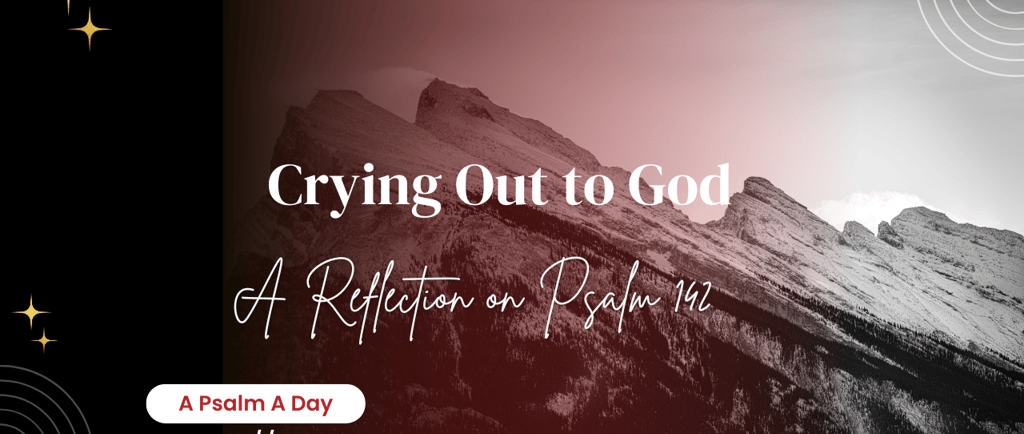Day 357 Crying Out to God – A Reflection on Psalm 142
Psalm 142 is a psalm for the weary, the lonely, and the overwhelmed. It’s a reminder that even in life’s darkest caves, we are not alone. God is our refuge, and He hears every cry.
3 min read


Crying Out to God
by Torrie Slaughter
Psalm 142 is a heartfelt cry for help, written by David during one of the most challenging periods of his life. As he hid in a cave, fleeing from King Saul’s relentless pursuit, David poured out his anguish, fear, and trust in God. This psalm resonates with anyone who has ever felt overwhelmed, isolated, or trapped by life’s circumstances.
Through David’s words, we are reminded that God hears us in our darkest moments and invites us to bring our burdens to Him. Let’s explore the themes and lessons of Psalm 142 and the hope it offers.
Bringing Our Pain to God
The psalm begins with an honest and raw declaration:
“I cry aloud to the Lord; I lift up my voice to the Lord for mercy. I pour out before Him my complaint; before Him I tell my trouble” (Psalm 142:1-2).
David doesn’t hold back. He brings his pain, frustrations, and fears directly to God. This vulnerability is a reminder that we don’t need to sanitize our emotions or pretend everything is okay when we come before God. He wants us to bring our whole selves, including our struggles, to Him.
Reflection:
When you’re overwhelmed, do you turn to God first? Psalm 142 encourages us to be honest in prayer, trusting that God is big enough to handle our pain.
Feeling Alone but Not Forgotten
David’s situation in the cave was dire. He describes his feelings of isolation:
“Look and see, there is no one at my right hand; no one is concerned for me. I have no refuge; no one cares for my life” (Psalm 142:4).
Have you ever felt this way—like no one understands or cares about what you’re going through? David’s words remind us that even when we feel utterly alone, God sees us. He cares deeply for us and is our refuge when all else fails.
Reflection:
Feeling alone doesn’t mean we are abandoned. In those moments, we can cling to the truth that God is with us and that He is our ever-present help in trouble (Psalm 46:1).
Trusting in God’s Deliverance
Despite his anguish, David’s faith shines through as he declares:
“I cry to You, Lord; I say, ‘You are my refuge, my portion in the land of the living’” (Psalm 142:5).
David recognizes that God is not just a distant deity but his personal refuge and source of hope. Even in the cave, David trusts that God will deliver him and fulfill His promises.
Reflection:
How often do we declare God as our refuge, even when our circumstances haven’t changed? Psalm 142 teaches us to trust in God’s faithfulness and sovereignty, knowing that He is working for our good.
From Desperation to Praise
The psalm concludes with a hopeful request:
“Set me free from my prison, that I may praise Your name. Then the righteous will gather about me because of Your goodness to me” (Psalm 142:7).
David’s ultimate desire isn’t just to escape his troubles but to glorify God and testify to His goodness. His faith in God’s deliverance leads him to anticipate a time of restored community and worship.
Reflection:
Even in our darkest moments, we can look forward to a future where God’s faithfulness is revealed, and we can praise Him for His goodness.
A Final Reflection
Psalm 142 is a psalm for the weary, the lonely, and the overwhelmed. It’s a reminder that even in life’s darkest caves, we are not alone. God is our refuge, and He hears every cry.
As you meditate on this psalm, let its truths sink into your heart. Whatever you’re facing today, take it to God in prayer. Trust in His deliverance, and look forward to the day when your story of struggle will become a testimony of His faithfulness.
The Bible In A Year Daily Reading Plan
Monday, December 23, 2024
Zechariah 4:1-5:11, Revelation 14:1-20, Psalm 142:1-7, Proverbs 30:21-23

We Want To Connect With You!
Contact Us
hello@ourgivenpurpose.com
© 2025. All rights reserved.

